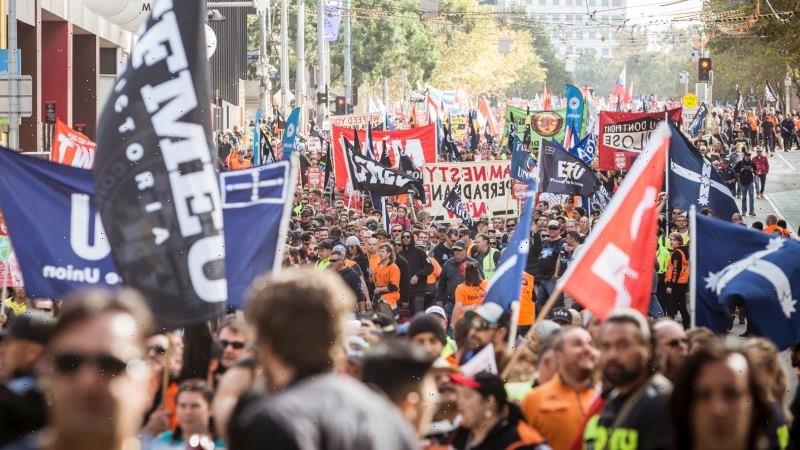
Unions push for a wage deal levy for non-members
01/10/2023Key points
- The HSU says it should be recompensed after campaigning for a 25 per cent pay rise for aged-care staff.
- The AMWU and Victorian Trades Hall Council agree there should be a clampdown on non-members who benefit from union pay deals.
- The ACTU is calling for all new migrant workers to be inducted by unions and given the opportunity to join one.
Union heavyweights in health, manufacturing and transport want to change laws so they can charge employees for wage deals if they’re not members.
As union membership declines in Australia, the ACTU is calling for all new migrant workers to be inducted by unions and given the opportunity to join one, in its submission to Australia’s migration review.
Several union heads are pushing to overturn Howard-era laws banning them from charging non-members a fee for pay deals.Credit:Chris Hopkins
Labor government sources who were not free to speak on the record did not rule out fee-for-bargaining reforms in the future but said they would not be part of the next tranche of industrial legislation.
“I think the concern is this could be used to hijack other priorities,” the source said.
Workplace Relations Minister Tony Burke’s office did not respond to questions.
Health Services Union national president Gerard Hayes said his union should be recompensed after campaigning for a 25 per cent pay rise for aged-care staff.
“Is it unreasonable that people who get a 25 per cent pay increase put the effort in to pay for that?” he asked.
Australian Manufacturing Workers’ Union secretary Steve Murphy agreed, saying: “Imagine walking into a fishing club or a footy club and demanding all the benefits without being a member. You wouldn’t even get through the door.”
On Sunday, United Workers Union head Tim Kennedy called for a clampdown on “free-riding” employees who had not signed up to unions.
A spokesperson for the Victorian Trades Hall Council said the organisation supported Kennedy’s position, adding, “if more workers contribute to the bargaining effort, we will see better results across the board”.
AMWU national secretary Steve Murphy wants current laws to be overhauled.Credit:Alex Ellinghausen
Unions NSW, the state’s peak body, made its case in August, when it called for a charge to be issued in line with several other countries, including Canada, parts of the United States and South Africa.
The collective push to overturn the Howard-era ban follows the release of figures by the Australian Bureau of Statistics showing union membership in Australia fell to a new historic low of 12.5 per cent last year, after nearly 50 years of decline.
Unions in parts of the US can charge non-members a fee for pay deals that benefit them, while several European countries impose rules that compel workers to join organisations that negotiate for workplace agreements or protections on their behalf.
Charging a bargaining fee was outlawed by former Liberal prime minister John Howard, a stance maintained under the Rudd-Gillard governments. Australian Council of Trade Unions secretary Sally McManus said it was not on the peak body’s agenda when asked in late November.
But ACTU president Michele O’Neil on Tuesday signalled her support for revising the laws, saying Australia was unusual internationally by having workplace laws restricting the content of collective agreements.
“Workers and employers should be able to negotiate and reach agreement over issues of concern to them,” O’Neil said.
Opposition workplace relations spokesperson Michaelia Cash described the push as “a disgraceful demand which trashes the fundamental right of all Australians to freedom of association”.
“Australians have the right not to join a union and they should never be forced to do so,” she said. “Australians should prepare for more incursions into their fundamental rights by this government, which will do anything to appease their union paymasters.”
Australian Industry Group head Innes Willox said it was unreasonable and unfair to require workers who exercised their right not to join a union to have to fund organisations’ activities.
“Nearly 90 per cent of the Australian workforce isn’t unionised. The lack of relevance of unions in most workplaces is increasingly clear,” he said.
In a submission to the government’s migration review, the ACTU recommended tackling exploitation by ensuring all migrant workers received an “on-arrival induction” from a union representative to inform them about their workplace rights, and give them the opportunity to join the union.
It also gave qualified support for raising the annual permanent migration intake from 195,000 to 200,000.
RMIT industrial relations expert Professor Anthony Forsyth said there was no sound reason to prevent unions and workers from including such clauses in enterprise agreements.
He said freedom-of-association arguments deployed to combat the idea did not stack up as employees would not be forced to join a union.
“They could choose either to join or pay the fee for services they obtain from having a union-negotiated agreement,” he said.
“This is an issue that the Albanese government really must address in the next round of IR legislative reforms this year.”
Cut through the noise of federal politics with news, views and expert analysis from Jacqueline Maley. Subscribers can sign up to our weekly Inside Politics newsletter here.
Most Viewed in Politics
From our partners
Source: Read Full Article



